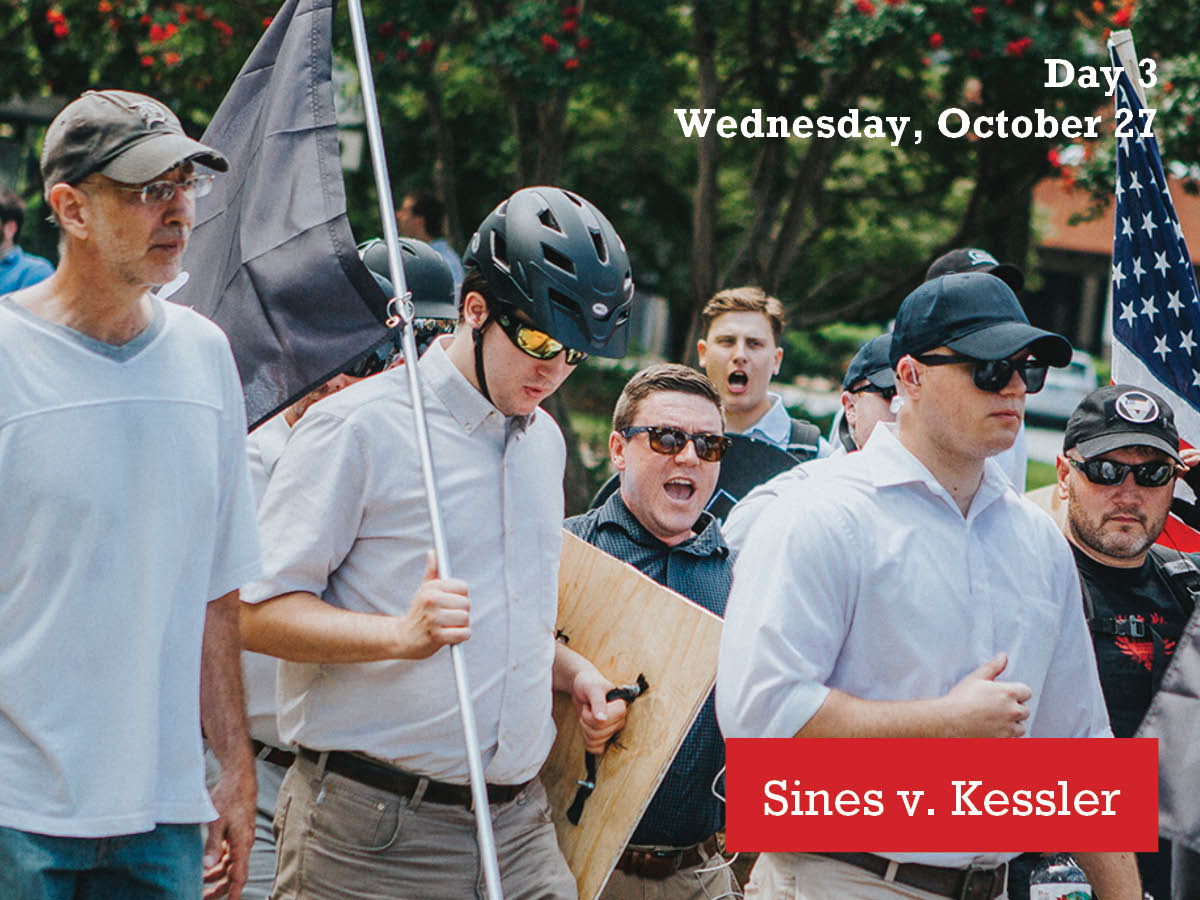Each day, we’ll have the latest news from the courtroom in the Sines v. Kessler Unite the Right trial. For coverage from previous days, check the list of links at the bottom of this page.
It took two-and-a-half days to find 12 people who said they could be impartial jurors in a lawsuit against many of the country’s most notorious white supremacists. By early afternoon on Wednesday, presiding Judge Norman K. Moon announced a jury had been empaneled in Sines v. Kessler.
The civil case brought by nine plaintiffs accuses more than two dozen hate groups and individuals responsible for the Unite the Right rally of conspiring to commit violence during the weekend of August 11 and 12, 2017. The trial is taking place in federal court in downtown Charlottesville, and the nature of the suit makes it unsurprising that nearly every prospective juror questioned during the process known as voir dire was asked about racism.
“Do you have any views if white people can be victims of racism,” Moon asked one prospective juror, a white man, on Wednesday morning.
“It could happen, but I think that, proportionally speaking, the historical and the incidents of racism against minorities is… significantly greater than what may happen to white people,” replied the man, who became one of the 12 final jury members.
Being personally impacted by the Unite the Right rally was another issue for some prospective jurors.
One, a white man, said he’d been forced to close his business near the Downtown Mall for the weekend of the Unite the Right rally. His business shuttered for good in 2018, and he admitted to being biased against the defendants.
“I didn’t agree with why they felt the statues should stay,” he said, referring to the controversy over Confederate monuments that was the basis of the Unite the Right rally.
The defense asked the court to strike the former downtown business owner from the prospective jury pool.
“He’s basically in the same position as the plaintiffs,” argued Cincinnati-based attorney James Kolenich for the defense. “It’s clear who he blames for that injury. I don’t think he can be fair and impartial.”
Moon eventually agreed, and the man was released from jury service.
Later, the defendants objected to the candidacy of another potential juror, a Black man. In response, the attorneys for the plaintiffs disputed the objection, using a legal argument called a Batson challenge—the plaintiffs’ attorneys claimed the exclusion was based on his race, which would violate his equal rights under the Constitution.
The defense pointed out that there were multiple other Black jurors to whom they hadn’t objected, and noted that all the jurors eliminated by the plaintiffs were white. Attorneys for the plaintiffs countered, saying that argument was insufficient to allow the Black juror’s elimination from the jury pool.
“The Fourth Circuit squarely held that striking one Black juror violates that juror’s equal protection rights. It’s a right that the juror possesses as well, to not have his own equal protection rights violated,” said plaintiffs’ attorney Karen Dunn.
It was arguments by Christopher Cantwell and Richard Spencer, both of whom are representing themselves, that seemed to sway Moon’s opinion. Both Spencer and Cantwell claimed it wasn’t the man’s race they objected to but his demeanor.
“I’m a professional talk radio host. I talk and listen for a living,” said Cantwell. “I detected deception in the man’s voice.”
“I am convinced that he was, in his own mind, nobly lying in order to serve on the jury. That’s my opinion. I might be wrong or I might be right. I have a right to make a discretionary decision,” said Spencer.
“Mr. Spencer gave his reasons for assessment of juror’s credibility. I do not find that the juror was being dishonest or evasive, but from Mr. Spencer’s and Mr. Cantwell’s viewpoints, I can see how they could arrive at the opinions that they did,” said Moon, denying the plaintiffs’ Batson motion to restore the Black juror to the jury pool.
With the 12-member jury seated by early afternoon, Moon convened court to give counsel for plaintiffs and defense time to prepare for opening statements on Thursday morning.
Previous Sines v. Kessler coverage
Pre-trial: Their day in court: Major lawsuit against Unite the Right neo-Nazis heads to trial
Day one, 10/25: Trial kicks off with jury selection
Day two, 10/26: Desperately seeking jury
